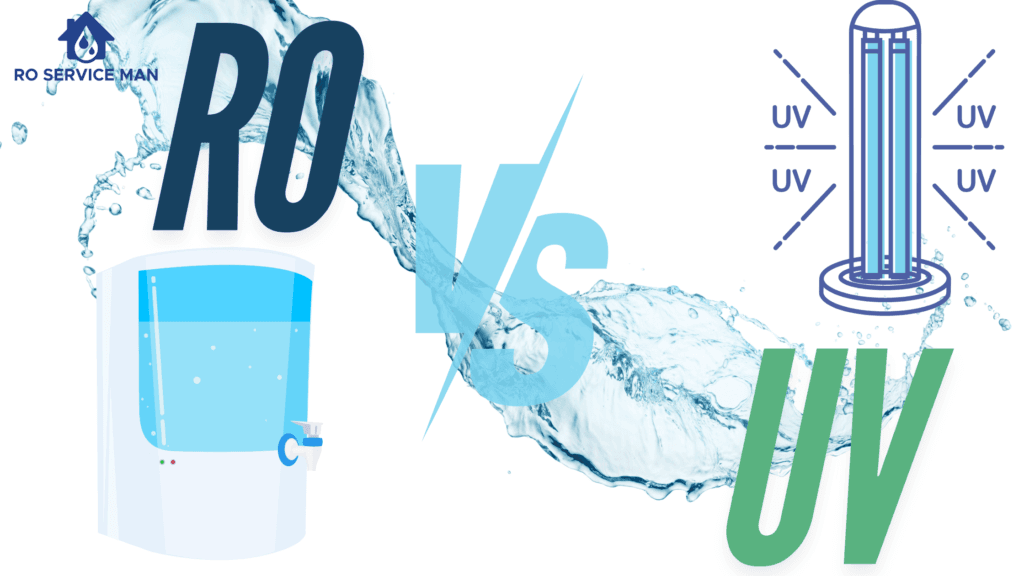
RO vs UV Water Purifier: Difference Between RO And UV Water Purifier
RO vs UV Water Purifier: The Difference Between RO And UV Water Purifier, Water Is Essential For Life, But It’s Quality Can Significantly Affect Your Health And Household Appliances. Hard water, Often Laden with Excessive Minerals Like Calcium And Magnesium, Poses Unique Challenges. Choosing The Right Water Purifier Becomes Crucial To Ensure Your Family Consumes Safe, Soft Water. But When It Comes To Hard Water, Should You Go For An RO (Reverse Osmosis) or UV (Ultraviolet) Purifier? Let’s Dive Deep Into The Features, Pros, And Cons Of These Technologies To Help You Decide.
Understanding RO and UV Water Purifiers:
What is RO Technology?
Reverse Osmosis (RO) Is A Filtration Process Where Water Passes Through A Semi-Permeable Membrane, Removing Dissolved Salts, Heavy Metals, And Impurities.
How it Works: RO Systems Use Pressure To Push Water Through A Specialized Membrane, Trapping Contaminants.
Benefits of RO for Hard Water: Ideal For Removing Excess Minerals, Salts, And Harmful Metals, Making Hard Water Soft And Safe For Consumption.
What is UV Technology?
Ultraviolet (UV) Purification Through UV Light Disinfects Water By Killing Bacteria, Viruses, And Other Micro-organisms.
How it Works: Water passes through a chamber where UV rays neutralize pathogens.
Benefits of UV for Water Purification: UV Is Excellent At Eliminating Biological Contaminants But Doesn’t Remove Dissolved Minerals Or Salts.
Key Differences Between RO and UV Purifiers:
Filtration Capabilities:
RO’s Role In Hard Water Treatment: RO Effectively Removes Dissolved Salts And Reduces Hardness, Making It Perfect For Hard Water.
UV’s Effectiveness Against Microorganisms: UV Purifiers Excel At Eliminating Biological Contaminants But Cannot Reduce Mineral Content Or Soften Water.
Water Wastage and Efficiency
RO Systems And Water Rejection: RO Systems Often Waste Water During Filtration, With Some Rejecting Up To 70% Of Input Water.
UV Systems And Energy Efficiency: UV Systems Are More Energy-Efficient And Don’t Produce Waste Water, But Their Scope Is Limited To Biological Contaminants Only.
Suitability for Hard Water
How Hard Water Impacts Health and Appliances
Hard Water Isn’t Just Tough On Your Skin And Hair; It Can Damage Appliances Like Washing Machines And Kettles Due To Scale Buildup. Consuming Hard Water Regularly May Lead To Kidney Stones Or Other Health Issues.
RO: A Clear Winner for Hard Water?
Removal of Dissolved Salts: RO Purifiers Effectively Reduce The Mineral Content, Making Water Soft And Pale.
Softening Hard Water Effectively: With Its Ability To Remove Harmful Salts And Metals, RO Stands Out As The Best Choice For Hard Water.
Cost and Maintenance
RO Systems: Investment And Maintenance
Cost of Installation: RO Systems Are Relatively Expensive Upfront.
Long-Term Maintenance Requirements: Regular Replacement Of Filters And Membranes Adds To The Cost.
UV Systems: Cheaper but Limited?
Initial Costs: UV Systems Are More Budget-Friendly.
Minimal Maintenance: With Fewer Parts To Replace, UV Systems Are Low-Maintenance But Less Versatile
Environmental Considerations
RO Systems, While Effective, Waste A Significant Amount Of Water, Raising Concerns About Environmental Sustainability. UV Systems, On The Other Hands Are Energy-Efficient But Limited In Their Application.
User Preferences and Lifestyle:
Choosing Between RO and UV Ultimately Depends On Your Household’s Needs. If You’re Dealing With Hard Water, RO Is The Clear Winner. However, For General Water Purification In Areas With Soft Water, UV Might Suffice.
Conclusion: Choosing the Right Purifier:
For Hard Water, RO Purifiers Offer Unparalleled Benefits By Removing Dissolved Salts And Making Water Safe And Soft. While UV Purifiers Are Great For Biological Contaminants, They Fall Short For Hard Water Treatment. Evaluate Your Water Quality, Budget, And Long-term Needs Before Making A Decision. A Combination Of RO And UV Technologies Can Provide Comprehensive Purification, Offering The Best Of Both Worlds.
FAQ’s
Can UV Purifiers Treat Hard Water?
No, UV Purifiers Cannot Remove Dissolved Salts Or Minerals From Hard Water.
What makes RO purifiers suitable for hard water?
RO purifiers reduce mineral content and soften water by removing dissolved salts and impurities.
Do RO systems waste a lot of water?
Yes, traditional RO systems can waste up to 70% of input water, but newer models are more efficient.
How often should I maintain an RO or UV system?
RO systems require filter changes every 6-12 months, while UV systems need occasional bulb replacements.
Are there purifiers combining RO and UV technologies?
Yes, There Are many Companies Offers modern purifiers integrate RO and UV for comprehensive water purification. RO Service Man Is The Best And Trustable Platform For Best RO Water Purifiers In India, Offers A Wide Range Of RO Water Purifiers Which Contains RO+UV+UF+TDS Adjuster+ Active Copper With ALKALINE,
RO Service Man RO Water Purifiers Sales, Service, Repair, And Installation Provider In India, We Are Here To Help You Choose the Right Water Purifier Suitable To your home, We Have a Wide Range Of Advanced Technology Water Purifiers With 1 Year Comprehensive Warranty And We Are The Top Best RO Water Purifier Repair Service In India, If You Have Any Queries Feel Free To Contact Us For More Info.